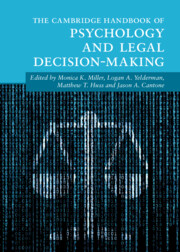Book contents
- The Cambridge Handbook of Psychology and Legal Decision-Making
- Cambridge Handbooks in Psychology
- The Cambridge Handbook of Psychology and Legal Decision-Making
- Copyright page
- Dedication
- Contents
- Figures
- Tables
- Editors
- Contributors
- Part I Introduction Chapters
- Part II Pretrial Phase Decision-Making
- Part III Trial Phase Decision-Making
- 20 Social Cognition of Jury Decision-Making
- 21 Beliefs About Juror Decision-Making and the Jury Process
- 22 Deciphering Directives
- 23 Decisions Surrounding the Use of Expert Testimony
- 24 Legal and Extralegal Factors that Affect Jurors’ Decisions
- 25 Decisions Regarding Insanity
- 26 Decision-Making in the Shadow of Evidence Law
- 27 Decision-Making in Contested Divorce Child Custody Cases
- Part IV Postconviction Phase Decisions
- Part V Other Legal Decision-Making
- Part VI Perspectives from the Field
- Part VII Conclusion
- Index
- References
21 - Beliefs About Juror Decision-Making and the Jury Process
from Part III - Trial Phase Decision-Making
Published online by Cambridge University Press: 22 February 2024
- The Cambridge Handbook of Psychology and Legal Decision-Making
- Cambridge Handbooks in Psychology
- The Cambridge Handbook of Psychology and Legal Decision-Making
- Copyright page
- Dedication
- Contents
- Figures
- Tables
- Editors
- Contributors
- Part I Introduction Chapters
- Part II Pretrial Phase Decision-Making
- Part III Trial Phase Decision-Making
- 20 Social Cognition of Jury Decision-Making
- 21 Beliefs About Juror Decision-Making and the Jury Process
- 22 Deciphering Directives
- 23 Decisions Surrounding the Use of Expert Testimony
- 24 Legal and Extralegal Factors that Affect Jurors’ Decisions
- 25 Decisions Regarding Insanity
- 26 Decision-Making in the Shadow of Evidence Law
- 27 Decision-Making in Contested Divorce Child Custody Cases
- Part IV Postconviction Phase Decisions
- Part V Other Legal Decision-Making
- Part VI Perspectives from the Field
- Part VII Conclusion
- Index
- References
Summary
This chapter discusses some of the existing beliefs about juror decision-making and the jury process at three distinct phases of a trial: before the trial, during the trial, and at the trial’s conclusion. Before the trial, there are beliefs surrounding the jury process, including jury duty, jury size, and jury selection (i.e. voir dire). During the trial, there are common beliefs surrounding courtroom factors that influence jury decision-making, including attitudes, beliefs, and expectations regarding attorneys, expert witnesses, confession evidence, and emotion-evoking evidence. Finally, at the end of trial, there is the existing belief that juries make extreme and unpredictable decisions in civil and criminal court. This chapter uses current research and empirical evidence within law and behavioral sciences to examine these myths, showing support for some of these beliefs, while also showing that others are simply myths about jury decision-making. Finally, the chapter discusses future research to address such myths.
- Type
- Chapter
- Information
- The Cambridge Handbook of Psychology and Legal Decision-Making , pp. 324 - 338Publisher: Cambridge University PressPrint publication year: 2024

